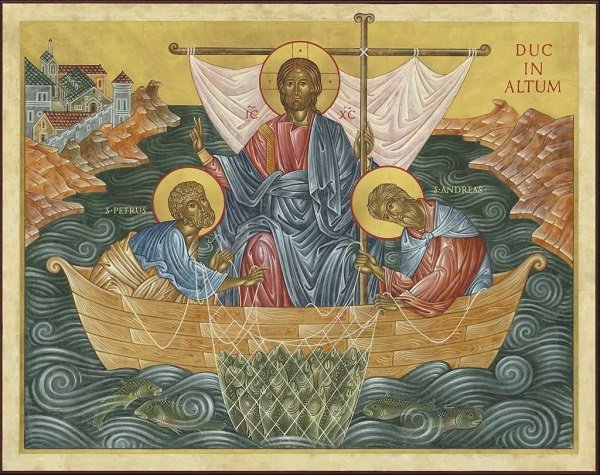Gospel of Luke
While people were listening to Jesus speak,
he proceeded to tell a parable because he was near Jerusalem
and they thought that the Kingdom of God
would appear there immediately.
So he said,
“A nobleman went off to a distant country
to obtain the kingship for himself and then to return.
He called ten of his servants and gave them ten gold coins
and told them, ‘Engage in trade with these until I return.’
His fellow citizens, however, despised him
and sent a delegation after him to announce,
‘We do not want this man to be our king.’
But when he returned after obtaining the kingship,
he had the servants called, to whom he had given the money,
to learn what they had gained by trading.
The first came forward and said,
‘Sir, your gold coin has earned ten additional ones.’
He replied, ‘Well done, good servant!
You have been faithful in this very small matter;
take charge of ten cities.’
Then the second came and reported,
‘Your gold coin, sir, has earned five more.’
And to this servant too he said,
‘You, take charge of five cities.’
Then the other servant came and said,
‘Sir, here is your gold coin;
I kept it stored away in a handkerchief,
for I was afraid of you, because you are a demanding man;
you take up what you did not lay down
and you harvest what you did not plant.’
He said to him,
‘With your own words I shall condemn you,
you wicked servant.
You knew I was a demanding man,
taking up what I did not lay down
and harvesting what I did not plant;
why did you not put my money in a bank?
Then on my return I would have collected it with interest.’
And to those standing by he said,
‘Take the gold coin from him
and give it to the servant who has ten.’
But they said to him,
‘Sir, he has ten gold coins.’
He replied, ‘I tell you,
to everyone who has, more will be given,
but from the one who has not,
even what he has will be taken away.
Now as for those enemies of mine who did not want me as their king,
bring them here and slay them before me.’”
After he had said this,he proceeded on his journey up to Jerusalem.
The parable of the nobleman is a striking tapestry, woven with the threads of expectation, responsibility, and judgment. It invites the listener not merely to hear, but to wrestle with the weight of stewardship under the watchful gaze of a king. Indeed, there is something both deeply uncomfortable and richly illuminating in these words, for they press upon us a truth we are often loath to confront: that the Kingdom of God is not a place of idle waiting, but of active participation.
The nobleman’s journey to a distant country, a metaphor of Christ’s ascension, carries with it an air of immediacy and suspense. The servants, entrusted with coins, stand in for you and me, each given a measure of grace, talent, or opportunity. It is tempting to see the coins as mere gold, but they are surely something deeper—symbols of the spiritual gifts we are called to steward. To bury them in a handkerchief, as one servant does, is to live in fear and false humility, shirking the divine invitation to labour in God’s service.
There is a peculiar terror in the third servant’s reasoning. He sees the nobleman as a hard man, demanding and unjust. Is it not curious how we, too, often paint God in the image of our fears rather than His truth? If we see Him as cruel, it is no wonder we hide what He has given us. Yet the nobleman’s response is both just and revelatory: “With your own words I shall condemn you.” The servant is not punished for his lack of ability, but for his lack of trust and faith. In the Kingdom, it is not perfection that is required, but faithfulness.
The fate of the enemies who reject the nobleman’s kingship strikes the modern ear with particular severity. But this, too, must be understood in its proper light. The rejection of the nobleman is not mere indifference; it is rebellion, a refusal to acknowledge the rightful king. In a sense, the parable forces a choice upon us: will we recognise Christ as King, or will we, like the delegation, declare, “We do not want this man to reign over us”? There is no neutral ground; to deny the King is to choose another.
And what of the servants who multiplied their coins? They are met with praise and reward, yet their success is not their own. The increase is the fruit of their faithfulness, of their willingness to engage with the world rather than retreat from it. “Well done, good servant!” is not a mere pat on the back, but the joyful recognition of a life lived in alignment with the will of the Master. The reward, strikingly, is not ease or rest, but greater responsibility—an echo of the eternal truth that in the Kingdom, service is the highest honour.
Perhaps the most unsettling line is the nobleman’s declaration: “To everyone who has, more will be given, but from the one who has not, even what he has will be taken away.” It is a paradox that defies earthly economics but resonates deeply in the spiritual realm. To those who faithfully use what they have been given, grace abounds. But to those who squander or hoard out of fear, even the little they have slips away. It is not God who is unfair, but we who fail to see the abundance already in our hands.The journey to Jerusalem looms large in the backdrop of this story. It is no coincidence that Jesus tells this parable on the threshold of His Passion. The nobleman’s return mirrors Christ’s eventual second coming, and the parable becomes a stark reminder of what is at stake. The Kingdom is not merely a future hope but a present reality, demanding our active engagement and trust.
What, then, is the lesson? It is not a call to frantic striving, but to faithful stewardship. It is an invitation to trust the King, to use what He has given us for His glory, and to live in expectation of His return. For in the end, it is not the amount of our gain that matters, but the heart with which we serve. And in that, we find the profound truth of the Kingdom: that the King Himself is our greatest treasure.



